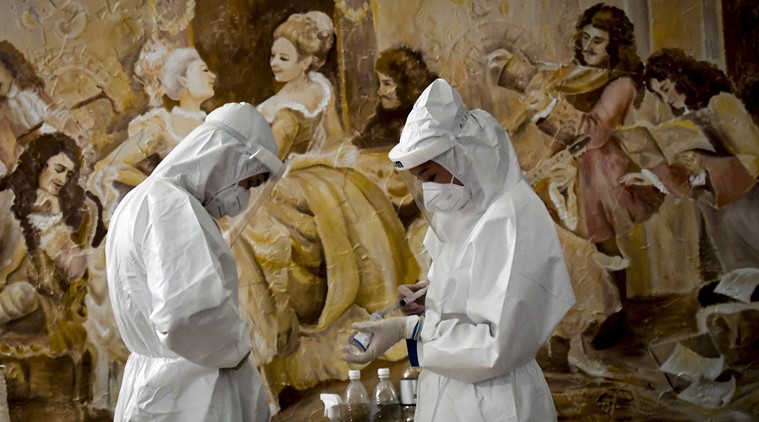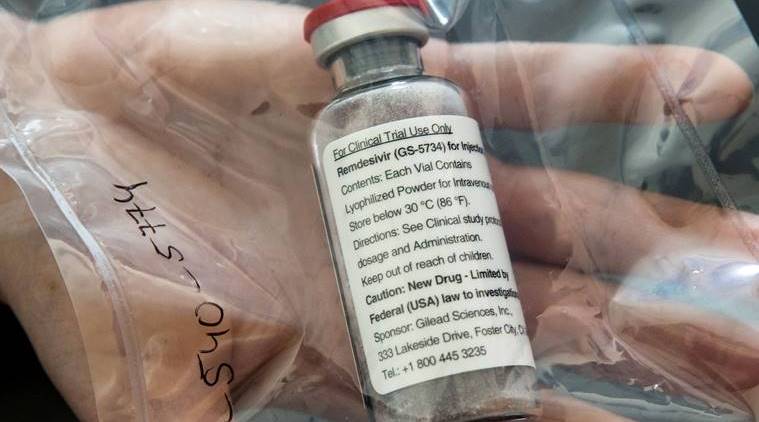Coronavirus (Covid-19) drugs latest updates: Itolizumab not part of India’s treatment protocol; Mavrilimumab shows promise
Coronavirus (Covid-19) drugs latest updates: Remdesivir has proven successful at shortening the recovery time for patients and Favipiravir has shown clinical improvement of up to 88% in mild to moderate cases.
 Coronavirus (Covid-19) drugs latest updates: Medical workers prepare medicine in a restaurant being used as a clinic in Bishkek, Kyrgyzstan. (AP)
Coronavirus (Covid-19) drugs latest updates: Medical workers prepare medicine in a restaurant being used as a clinic in Bishkek, Kyrgyzstan. (AP)
Coronavirus (Covid-19) drugs latest updates: While the vaccines for Covid-19 are being developed from scratch, most of the 150 different medicines undergoing trials and research are drugs that were approved for treating other diseases. There is still no specific proven treatment for the novel coronavirus.
Besides the UK’s Recovery trial, with more than 12,000 patients taking part, and the World Health Organisation’s Solidarity trial, several pharmaceutical companies are running trials of their own drugs. So far, only Dexamethasone has shown life-saving results against Covid-19.
Remdesivir, an antiviral drug that was originally developed to treat Ebola, has proven successful at shortening the recovery time for patients and Favipiravir has shown clinical improvement of up to 88 per cent in mild to moderate cases.
Coronavirus (Covid-19) drugs latest updates
💊 Itolizumab not part of treatment protocol, says Centre
Weeks after the Drug Controller General of India approved Itolizumab for emergency use in Covid-19 treatment, the Union Health Ministry has said the drug has not been included in the national treatment protocol. Manufactured by Biocon, Itolizumab is used for treating psoriasis — a skin condition.
According to a statement issued by the Health Ministry, the National Task Force on Covid-19 contended there was “very little evidence in favour of this medicine”.
In trials, the drug has been shown to be effective in preventing cardio-renal complications in Covid-19 patients who also have acute respiratory distress. Some other inflammations commonly found in such patients were also suppressed.
READ | Pfizer-BioNTech on the heels of Moderna, enters late stage clinical trials
💊 EIDD-2801 Covid-19 drug in Phase II trials
US-based Ridgeback Biotherapeutics has commenced enrollment for the Phase 2 trial of its Covid-19 drug candidate EIDD-2801, which has shown to inhibit the replication of multiple RNA viruses. Early test results have shown that EIDD-2801, an oral antiviral drug, can be used as either a prophylactic or a therapeutic for Covid-19, a report published in Science Translational Medicine said.
EIDD-2801 has shown to prevent severe lung damage in infected mice. It also reduced the viral load and weight loss in mice when given as a treatment between 12 and 48 hours after infection began.
 Remdesivir is an antiviral drug that was originally developed to treat Ebola. (File)
Remdesivir is an antiviral drug that was originally developed to treat Ebola. (File)
💊 Mavrilimumab shown to improve clinical outcomes
Even though various studies are still underway, early results have shown some patients treated with mavrilimumab did not need mechanical ventilation, according to a study published in The Lancet Rheumatology. Mavrilimumab, a granulocyte-macrophage colony-stimulating factor (GM-CSF) receptor inhibitor, has also shown to improve clinical outcomes in patients with Covid-19 pneumonia and systemic hyperinflammation.
A study conducted on 39 patients in Milan showed that none of the 13 non-mechanically ventilated patients who received a single intravenous dose (6 mg/kg) of mavrilimumab died. However, out of the 26 patients of the controller group, seven died.
READ | Covid-19: India at the centre of vaccine and Moderna’s phase III trials
💊 Researchers identify 21 drugs that could treat Covid-19
According to a study published in the journal Nature, a global team of scientists has identified 21 existing drugs that stop the replication of SARS-CoV-2.
Of the 21 drugs, the scientists, including those of Indian origin, have found that 13 have previously entered clinical trials for other indications and are effective at concentrations, or doses, that could potentially be safely achieved in Covid-19 patients.
Two of them have already been approved by the US Food and Drug Administration (FDA) — astemizole (allergies), clofazamine (leprosy). Four of the drugs worked synergistically with remdesivir.
“This study significantly expands the possible therapeutic options for COVID-19 patients, especially since many of the molecules already have clinical safety data in humans. Based on our current analysis, clofazimine, hanfangchin A, apilimod and ONO 5334 represent the best near-term options for an effective treatment,” said Sumit Chanda, PhD, professor at Sanford Burnham Prebys Medical Discovery Institute.
In the study, the scientists performed extensive testing and validation studies, including evaluating the drugs on human lung biopsies that were infected with the virus.
Photos




- 01
- 02
- 03
- 04
- 05



























